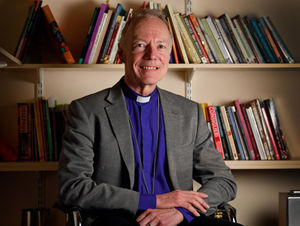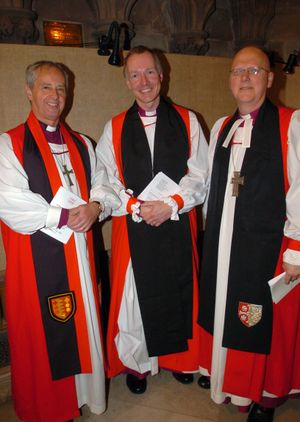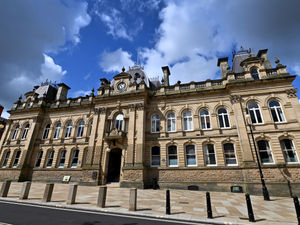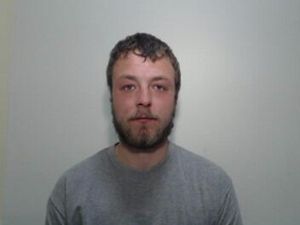A well-earned retirement for Bishop after answering his spiritual calling
What started out as a voice in the back of his head has led to nearly 40 years of a fulfilling and enjoyable career.

The Bishop of Wolverhampton, Rt. Rev. Clive Gregory, has made his mark working with under-served communities across his home county of Kent, as well as across the West Midlands in Coventry and Wolverhampton.
He has helped build churches, created bonds across different faith communities and become a much-respected figure across the Episcopal Area of Wolverhampton which includes the Archdeaconries of Walsall and Lichfield.
The 61-year-old will bid a fond farewell and begin his retirement after a service at St Peters Church in Wolverhampton on Sunday, April 9, before making a move to his new home in the Lake District.
He said the decision to step down was due to having spent so long in such a demanding role and deciding it was time to bring someone fresh into the role.
He said: "I think that 16 years in such a senior leadership position is really demanding and very draining and I think I just felt that I wasn't able to continue to offer quite the energy that's required in the role and it was best for for the church to have someone fresh come in.
"Some people were surprised as I'm a little bit short of the conventional age for retirement, but I don't look at it in age, but rather how long I've been in post and the demands are considerable and increasing.
"I don't know who will be in place after me, but the Bishop of Lichfield will handle the process and it isn't uncommon for there to be a pause between appointments, so it may take some time for the next Bishop to be put in place."
As he approaches the end of his career and looks forward a well-earned retirement, Clive Gregory has been reflecting on his journey from a young man from Sevenoaks, unsure of what he wanted to do with his life, to life at the top of the Christian church.

He said it started while doing a summer job in Kent as a labourer on a hops farm and during the four weeks he worked, he started to hear a nagging voice in the back of his head about religion that he couldn't shake off.
He said: "I was brought up in a traditional Church of England-going family, so going to church was natural throughout my childhood and I sang in the choir and went to the youth club, but while I had faith as a young child, I never thought about becoming a vicar and going into church.
"It really didn't cross my mind until I was 21 and a student at Lancaster University, studying English, and was at home in the holidays to add some money to fund my student lifestyle which, in the Kent countryside, meant the local farm and this farm was known for growing hops for beer production.
"I was working in the oast house, where the hops were dried before being pressed down into big sacks and sent off to the brewery, so these were long hours and very tiring, but you did get pauses where you sat around and talked and, at the time, you would have a beer with your colleagues at lunchtime.
"As I was working over those four weeks, I had this voice in my head, a rather insistent one saying 'you need to be a vicar and I'm calling you to ordained ministry', which I pushed to the back of my mind originally, but it stayed there and I started to think more and more about it."
That thought, Mr Gregory said, led him to consult with his local vicar and the university chaplain in Lancaster and ask the questions about what he should do, but he said a recent look back over his diaries from his teenage years had revealed his serious Christian beliefs at a young age.
He said: "I kept that diary for five years when I was in my teenage years and looking back over it recently had reminded me about the fact that I was actually quite serious about my beliefs and trying to be a Christian and do the right thing."
Following on from his summer of thoughts and the conversations he had, Mr Gregory entered a summer placement at a church in Surrey as part of a process by the Church of England to help him learn about the role and see whether it was right for him.
He said it gave him the opportunity to learn about the role of a vicar, from the daily routine to the challenges faced, and then went to a selection conference, which he described as a very rigorous process.
He said: "It was based on army officer selection and you went away for a residential for three or four days and had group work, as well as individual interviews and role play scenarios and you're being observed by the selectors at mealtimes, so it was a fully immersive experience.
"You also didn't know at the end of it whether you'd be recommended for training for ordination or not, but 10 days later, I got the letter which was a recommendation for training and led to Theological College for three years and then going through curacy into becoming a reverend and a priest.
"As soon as you leave college, you are ordained, which means that you have the title of reverend and can wear a dog collar and perform functions that you would associate with a clergyman, such as baptism and funerals and, a year later, you become a priest, which means being able to marry people."
Curacy for Clive Gregory was on the Kent coast in Margate in the late 1980s, an area he said had its challenges economically, but had a great church and was a place he had a lot of happy memories of and prepared him for his next step, which led to the Midlands.
He said: "The experience in Margate was great and I had a few amazing years there and after curacy, I thought carefully about where God was calling me to go and I had quite a strong conviction as I was at the end of my curacy and I wasn't even 30 yet.
"I had a conviction to work with young people, so I became a university chaplain at Warwick University in 1992 for the next six years at a largely student-focussed ministry, spending a lot of time with students in a whole variety of roles.
"There was a chaplaincy centre in the middle of the university which became my base and we did our Sunday services, but also had discussion groups and I did one-on-one counselling and pastoral work and got involved in student societies, so had a lot of fun in that role."
Following six years at Warwick University, the next step for the Bishop was to finally become the vicar of his own church, so he became the Team Rector of Coventry East in 1998, beginning nine years of work which he described as rewarding and memorable.
He said: "During the course of those nine years, we moved out of our old Victorian church into a newly developed and expanded church and community centre in what was a very deprived area of Coventry called Hillfields.
"We applied for and got funding from the Lottery Fund and from European funding as the vision there was to build not just a place for Christians to gather and worship, but was also a community centre.
"We opened the new building in 2001 and it's still there and, I'm told, doing well, so it was great to be there and have that responsibility for nine years for those churches."
The next big step in his church career saw Rev. Clive Gregory become Bishop Clive Gregory which, he said, wasn't something you applied for, but was something you were chosen for.

He said: "What happens is that you go into a pool for people who might be suitable for roles as Bishops and if a job comes up, they will match you up for it based on skills and experience and invite you for interview, which they did for the Wolverhampton role.
"The senior Bishop in the diocese, in this case, the Bishop of Lichfield, had his appointment process which he could run as he wanted and he took advisement from other people before deciding on the four people for interview, of which I was one of them.
"I think it was because Coventry wasn't all that different, socio-economically, to Wolverhampton and it helped lead me to have a successful interview and be appointed as Bishop of Wolverhampton in April 2007."
Among the highlights of his 16 years as Bishop, according to Mr Gregory, have included being able to take hundreds of confirmation services across the city, something he described as an important stage in the life of a Christian and a powerful experience for himself.
Other highlights included holding licensing services for new vicars and welcoming them to their new parishes and the work done with other faiths to encourage discussions through Interfaith Wolverhampton, something he said he was proud to be part of.
He said: "There's a lot of mutual respect across the faith communities and the work done by Interfaith Wolverhampton has come about through the really positive relationships between the leaders and communities.
"I've been able to work quite closely on occasions with my fellow faith leaders and I am most proud of the response from the community to the tragic ISIS beheading of two aid workers in 2014, which was so barbaric and awful as they were humanitarians and friends of Muslims.
"We were able to join together and hold a really powerful event in the city centre to express our commitment to peace and fierce, passionate opposition to what had been done and battle the anti-Muslim feelings that were coming up.
"I've also had the privilege of going into schools with my friend Imam Rashid from Wolverhampton Central Mosque and explaining what we have in common and answering all their questions, so it's wonderful to be able to do that.
"When people ask about my legacy as Bishop, I would like to think that I have continued honourably and with commitment the work of my predecessors in helping to foster close relations with people of all faiths, which I feel is really important for the city's wellbeing."
While retirement will take the Bishop and his wife Jenny to Lancashire on the banks of the Lake District, he will not leave the church altogether and aims to, alongside walking and watching cricket, to be available to help.
He said: "The thing about being a retired priest is that you just choose what you do and when you do it and I know retired ones who are busier than they ever were when they weren't retired.
"I don't intend to be like that, but equally, there will be opportunities outside the church that will be worthwhile and valuable, so I'm looking forward to finding out what God has store in for me.
"I did pray to God, as you might expect, for guidance, and I didn't hear any discouragement coming back, just that little voice in my head, like 40 years ago, telling me that it was the right time."




